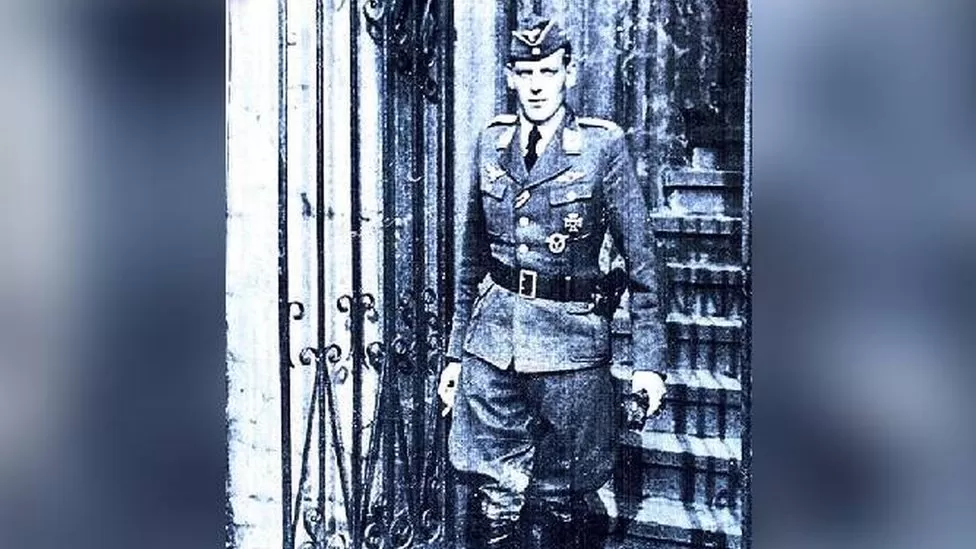A medal that a German pilot received during World War Two has been given back to his family after more than 80 years since he died.
When Güenter Brixius had an accident at Llanhailo Farm in Radnorshire (now Powys) in April 1942, he was a highly regarded pilot in the Luftwaffe and only 26 years old.
He got the Iron Cross in 1939, and it has now been given back to his family in Münster, near Dortmund.
The son of the people staying at the farm found Brixius’s family as a way of bringing both countries closer together.
Brixius’ bomber plane, called Junkers Ju-88A-6, left from occupied Belgium and got shot down over the Bristol Channel. This happened during a cloudy night, and the plane had already lost its radio and navigation systems.
The plane struggled to reach Hereford, where it was stopped by an RAF Beaufighter sent from the Shrewsbury area, which caused the plane’s destruction.
The main attack was on the city of Bath, but Brixius’s flight took a different path to distract enemy fighters from the main group.
After crashing into the hillside in Hundred House, his body and the body of his gunner Adolf Liessig were placed by local military members in the farm’s storage building. It is possible that his Iron Cross medal was either lost or thrown away there.
Gareth Bufton, who is one of eight kids that grew up on the farm, gave the medal to the other family in a meeting that happened in September.
Even though he was not born until 1958, Mr. Bufton said that his family had the medal for a long time. They were not completely sure why they still had it.
Gareth Bufton, who lived on the same farm as the crash, has given back the Iron Cross that belonged to him to his family.
He said, “After our mom passed away, we realized that this thing didn’t belong to us anymore. We also knew that there was another family in Germany who would value and appreciate this recognition of our dad’s courage. ”
Gareth did something very kind for our family in Germany, and we consider it a great act of friendship.
The accident occurred early in the morning, but Mr. Bufton’s family didn’t find out about it until much later in the day.
The accident appeared to have occurred near my family. “He said that even though people claimed the sound could be heard from 20 miles away, his parents and baby sister Connie slept through it. ”
The next morning, when they woke up to milk the cows, they saw a lot of activity outside the kitchen window and realized something was happening.
None of them could come near because there were still bullets exploding, and I don’t think they wanted them to see the dead bodies.
The two people who operated the radio and navigated the plane were able to jump out with parachutes and became prisoners in the war. However, Brixius and Liessig stayed with the broken plane and tried to land it safely. Unfortunately, the plane eventually crashed into a field where there were sheep on a hill on the farm.
They were laid to rest a few days later at Glascwm Church. Later on, their bodies were moved to a German war cemetery at Cannock Chase in Staffordshire.
However, once the bodies were removed and the granary was returned, Mr. Bufton’s parents, Jack and Muriel, discovered the missing Iron Cross decorated with the swastika.
Mr Bufton said that they had always discussed finding the family. They knew who the family belonged to, but before the internet, it was more difficult to locate people compared to today.
My mom left the farm when my brother started taking care of it, and afterwards it was stored in a box until she passed away.
Mr Bufton and his wife Yvonne, who had worked in Germany and knew people from Brixius’s hometown, were able to gather the information.
Ulrich Brixius stated that his uncle was a nice young man who enjoyed playing the violin and hockey. He was the third child out of four and was born in Essen, North Rhine-Westphalia.
He sadly knew very little about him because his father’s three brothers had all been killed in action.
The family doesn’t know why Brixius got the Iron Cross, but since he received it in September 1939, they think it might be for his involvement in either Poland or the Sudetenland.
Date:

